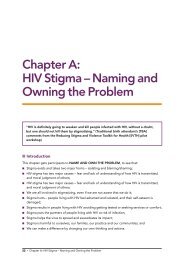Implementing Multiple Gender Strategies to Improve HIV and ... - ICRW
Implementing Multiple Gender Strategies to Improve HIV and ... - ICRW
Implementing Multiple Gender Strategies to Improve HIV and ... - ICRW
Create successful ePaper yourself
Turn your PDF publications into a flip-book with our unique Google optimized e-Paper software.
they were paid a stipend. The communication skills women acquired in the<br />
theater training could also be used outside the theater context, such as in<br />
job interviews <strong>and</strong> in communications-related work tasks, <strong>and</strong> thus<br />
equipped women with transferrable vocational skills.<br />
Target Audience • Low-income women living in Khayelitsha community<br />
• The Khayelitsha community<br />
Level of Intervention • Community<br />
• District<br />
Geographic<br />
Location<br />
The <strong>to</strong>wnship of Khayelitsha<br />
Timeframe January 2006–December 2006<br />
Funders<br />
United Nations Trust Fund in Support of Actions <strong>to</strong> End Violence Against<br />
Women<br />
Partner<br />
Organizations<br />
Implementation partners:<br />
• Treatment Action Campaign (TAC), Khayelitsha District<br />
• Wola Nani (Khayelitsha)<br />
• Simelela Rape Survivors Centre<br />
IMPLEMENTATION AND RESULTS<br />
Start-up <strong>and</strong><br />
Implementation<br />
Process<br />
The Laphum’ Ilanga project grew out of discussions with a range of<br />
community-based organizations <strong>and</strong> the Rape Crisis Center about the need<br />
<strong>to</strong> raise awareness of the link between gender-based violence <strong>and</strong> <strong>HIV</strong><br />
transmission. Laphum’ Ilanga drew specifically on Forum Theater, an<br />
interactive participa<strong>to</strong>ry theater form developed in Latin America in the<br />
1960s by Augus<strong>to</strong> Boal.<br />
Support groups, volunteers, <strong>and</strong> counselors within three organizations,<br />
Simelela Rape Clinic, Treatment Action Campaign (TAC) <strong>and</strong> Wola Nani,<br />
identified a group of 28 women <strong>to</strong> participate in a two-week training<br />
workshop. The women were introduced <strong>to</strong> Forum Theater <strong>and</strong> the process<br />
of creating plays that would lead <strong>to</strong> audience participation, <strong>and</strong> recounted<br />
<strong>and</strong> explored their own experiences with violence, power relations, <strong>and</strong> <strong>HIV</strong><br />
<strong>and</strong> AIDS, among other things. The women then performed eight different<br />
plays at twelve outreach performances between June <strong>and</strong> August 2006.<br />
They performed <strong>to</strong> diverse audiences in Khayelitsha at a variety of venues:<br />
church events, taxi <strong>and</strong> bus terminals, shopping malls, <strong>and</strong> advocacy<br />
events organized by local partners <strong>and</strong> local community centers. The<br />
women also participated in outreach activities around the 16 Days<br />
campaign, including appearances on community radio.<br />
Local Involvement/<br />
Ownership<br />
Community involvement was high at the grassroots level; however,<br />
indications of ownership by partner organizations did not emerge. Project<br />
129
















